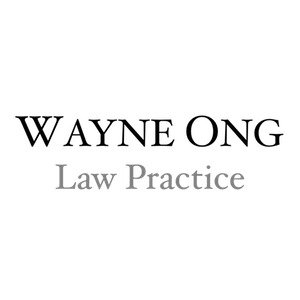Best International Trade Law Lawyers in Cecil
Share your needs with us, get contacted by law firms.
Free. Takes 2 min.
List of the best lawyers in Cecil, Singapore
About International Trade Law in Cecil, Singapore
International Trade Law in Cecil, Singapore encompasses the set of rules and regulations that govern the conduct of trade across borders. Singapore's strategic location and status as a global trade hub make it a focal point for International Trade Law, ensuring that the exchange of goods and services is conducted legally and ethically. The laws in this field address a wide range of issues, from tariffs and trade agreements to dispute resolution and the protection of intellectual property rights.
Why You May Need a Lawyer
Individuals and businesses may need legal assistance in International Trade Law for various reasons:
- Trade Disputes: When there's a conflict related to international contracts or agreements.
- Import/Export Compliance: Ensuring that transactions comply with local and international regulations.
- Intellectual Property Rights (IPR): Protecting trademarks, patents, and copyrights in international markets.
- Drafting Contracts: Creating clear and enforceable international agreements.
- Customs Regulations: Navigating the complexities of customs clearances.
- Licensing and Permits: Obtaining the necessary authorizations for trade activities.
- Anti-dumping Measures: Addressing unfair trade practices affecting local markets.
Local Laws Overview
Singapore's legal framework for international trade is influenced by its commitment to free trade and open markets. Key aspects include:
- Customs Act: Governs the import and export of goods and the duties applicable.
- Free Trade Agreements (FTAs): Singapore has numerous FTAs that facilitate smoother trade relations with various countries.
- Export Control Regulations: Restrictions on the export of certain goods and technologies.
- GST on Imports: Rules pertaining to Goods and Services Tax for imported goods.
- Trade Marks Act and Copyright Act: Provides protection for intellectual property.
Frequently Asked Questions
What is International Trade Law?
International Trade Law encompasses regulations and agreements that facilitate and govern trade activities between countries.
Why is Singapore important in international trade?
Singapore's strategic location, robust legal framework, and free trade policies make it a pivotal hub in global trade networks.
How can a lawyer assist with trade compliance?
Lawyers help ensure that trade activities adhere to all applicable laws, minimizing the risk of penalties and legal disputes.
What are the main trade agreements affecting Singapore?
Singapore is part of several FTAs that affect trade terms with partner countries, including the ASEAN Free Trade Area and the Comprehensive and Progressive Agreement for Trans-Pacific Partnership.
How can I protect my intellectual property internationally?
A legal expert can guide you through registering trademarks and patents and enforcing your rights in different jurisdictions.
What should be included in international trade contracts?
Key elements include payment terms, delivery schedules, risk management clauses, and dispute resolution mechanisms.
What are anti-dumping measures?
These are policies aimed at preventing foreign companies from selling goods at unfairly low prices, harming local industries.
Do I need a lawyer for every international trade transaction?
While not mandatory, consulting a lawyer can help navigate complex regulations and avoid potential legal issues.
What is the role of Singapore Customs in trade?
Singapore Customs is responsible for regulating goods movement across borders and ensuring compliance with trade and customs laws.
How are disputes in international trade resolved?
Disputes can be resolved through arbitration, mediation, or litigation, depending on the agreement between parties.
Additional Resources
For those seeking further assistance, the following resources may be helpful:
- International Enterprise Singapore: Supports businesses in internationalizing their operations.
- Singapore International Arbitration Centre: Offers arbitration services for trade disputes.
- Ministry of Trade and Industry: Provides insights into trade policies and regulations.
- Singapore Customs: Offers guidance on import/export procedures and compliance.
Next Steps
If you require legal assistance in International Trade Law, consider the following steps:
- Research and identify law firms with expertise in International Trade Law based in Singapore.
- Schedule consultations to discuss your case and evaluate the lawyer’s experience and approach.
- Ensure you have all relevant documentation ready for review during consultations.
- Clarify the legal fees and agreements before engaging their services.
Seeking professional legal assistance can provide peace of mind and ensure that your international trade activities are conducted in compliance with applicable laws.
Lawzana helps you find the best lawyers and law firms in Cecil through a curated and pre-screened list of qualified legal professionals. Our platform offers rankings and detailed profiles of attorneys and law firms, allowing you to compare based on practice areas, including International Trade Law, experience, and client feedback.
Each profile includes a description of the firm's areas of practice, client reviews, team members and partners, year of establishment, spoken languages, office locations, contact information, social media presence, and any published articles or resources. Most firms on our platform speak English and are experienced in both local and international legal matters.
Get a quote from top-rated law firms in Cecil, Singapore — quickly, securely, and without unnecessary hassle.
Disclaimer:
The information provided on this page is for general informational purposes only and does not constitute legal advice. While we strive to ensure the accuracy and relevance of the content, legal information may change over time, and interpretations of the law can vary. You should always consult with a qualified legal professional for advice specific to your situation.
We disclaim all liability for actions taken or not taken based on the content of this page. If you believe any information is incorrect or outdated, please contact us, and we will review and update it where appropriate.








